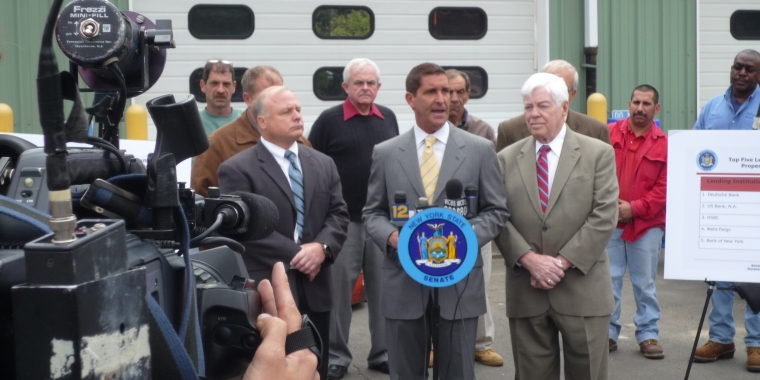
Foreclosure Aftermath
Jeffrey D. Klein
October 2, 2009
-
ISSUE:
- Property Tax

FORECLOSURE AFTERMATH
Senator Klein and Senator Morahan unveil new data showing 354 homes went into foreclosure in Rockland County this past year, 124 are owned by banks
NEW YORK- Senator Jeff Klein (D-34th Senate District) and Senator Thomas Morahan (R-38th Senate District) presented new data today showing the impact of neglected foreclosed properties in Rockland County.
Klein and Morahan unveiled the new data with Village and Town of Haverstraw officials in light of the recent sky-rocketing property taxes in that area. In August 2006 the Mirant Corporation, a company that owns two local power plants and also the area’s largest tax payer, won a lawsuit requiring Rockland County and several surrounding towns to pay the company 275-million dollars. The money makes up for tax overcharges dating back to more than a decade. Since the ruling, property taxes in the area have increased from 20 to 100 percent, making it more difficult for working class homeowners to pay their mortgages.
According to Klein and Morahan’s study, 354 homes went into foreclosure in Rockland County this past year. 124 of those properties are now Real Estate Owned (REO) meaning a lender acquired the property. Klein and Morahan’s study reports out of the 124 REO bank owned properties, 34% are in Clarktown, 22% in Haverstraw and Ramapo, 11% in Orangetown and 13% in Stony Point. In total, more than 35 lending institutions own foreclosed REO properties in the area. The top five are Deutsche Bank (31), US Bank, N.A. (14), HSBC (12), Wells Fargo (9) and Bank of New York (8). In the study, Klein and Morahan broke down the data by zip codes. The top 5 zip codes in Rockland County with REO properties are as follows: Spring Valley (24), New City (15), Nanuet (12), Suffern (10) and Nyack (7).
In May 2009 the New York State Senate passed the Neighborhood Preservation Act, a bill promoted by Klein and Morahan that would require banks to maintain foreclosed properties, keeping them in a safe and habitable condition until they are sold, occupied by a renter or legally disposed.
Klein and Morahan promoted the bill (S1182) after seeing the destructive effects of unkempt, foreclosed properties.
“The foreclosure crisis is now a neighborhood crisis, as the bank’s failure to maintain these properties leads to the increased likelihood of drugs and crime on our community streets and the decreased value of our homes,” said Klein. “We need legislation that will protect our homes and our neighborhoods.”
Klein and Morahan report in New York State, the number of neighboring homes losing value in 2009 due to foreclosures is 5,295,621. The combined monetary decrease in home values/tax base in New York State due to subprime foreclosures in 2009 is 65.3 billion dollars. According to the Center for Responsible Lending, in Rockland County by 2006 there was a decrease in the county’s house values and tax base of 155,949,800.
Klein first saw how an unmaintained, foreclosed home brings more crime into a neighborhood in September 2007 after a group of constituents complained about a bank-owned foreclosed home in their Bronx neighborhood. The home was in disrepair and became a haven for drugs and partying. After numerous calls to the bank, Klein had the home boarded up and maintained properly.
Klein and Morahan believe S1182 would help combat the effect of foreclosed, unmaintained homes and save taxpayers’ money since they’re the ones responsible to pay for the clean-up of a foreclosed home if the bank neglects it.
“I am pleased to have worked with Senator Klein to pass this legislation in the Senate which helps local municipalities deal with the effects of bank foreclosures. As a result, these properties will be kept in a safe and habitable condition, without having to pass on the costs to the local taxpayer. Therefore, I am joining with Senator Klein in calling upon the Assembly to pass this legislation,” said Morahan.
"This legislation would address the undue financial burden which is placed
upon local municipalities that must deal with properties which have created
detrimental and unsightly conditions within our neighborhoods," said Howard Phillips Jr., the Town of Haverstraw Supervisor.
The bill passed the Senate and is now in the Assembly.
* * *

